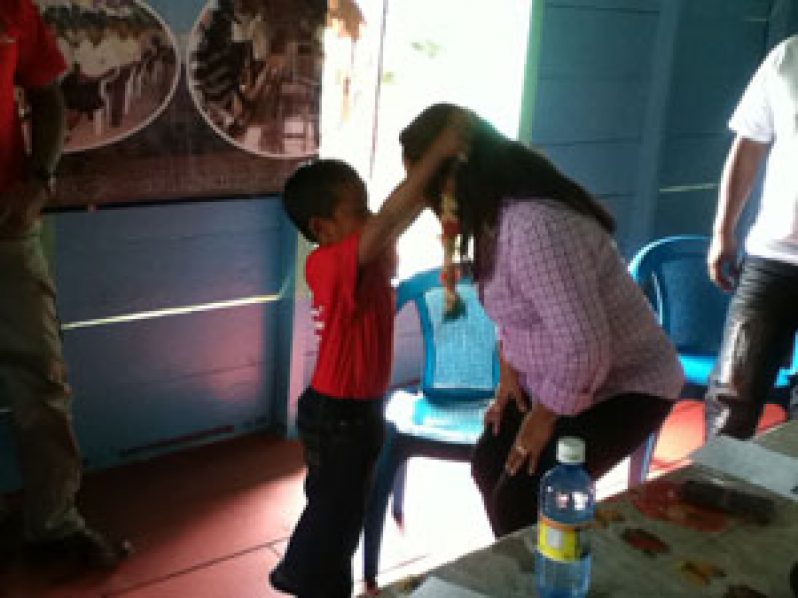LAST weekend, hundreds of indigenous young people rallied in the remote village of Warawatta, Kamarang, after trekking miles through dense forest and canoeing along rivers to participate and sign up for the hinterland Youth Entrepreneurship and Apprenticeship Project in Region 7 (Cuyuni/Mazaruni).
 Minister of Amerindian Affairs Pauline Sukhai, in addressing the youths on Sunday, challenged them to stay in their communities, use their resources and stop relying on the coastland people for employment opportunities and sustainability.
Minister of Amerindian Affairs Pauline Sukhai, in addressing the youths on Sunday, challenged them to stay in their communities, use their resources and stop relying on the coastland people for employment opportunities and sustainability.
“We are seeking to build skills in leadership and governance in communities. The project is intended for the young people to be attached to their villages,” she emphasised, adding that when the project is completed the ministry hopes that the apprentices will be able to deal with comprehensive issues in their communities and build cultural development, while filling gaps of service that are lacking in their villages.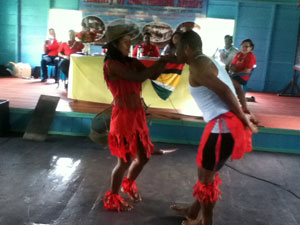
She asserted that human development is the heartbeat of the project and it is critical that hinterland people be versed in management, leadership and governance so that they can service their communities and their people.
But first, she said, “We have to identify our niche and direct the energies of our young people to utilise it,” highlighting the rapid burst of job creation in Mainstay-Whyaka, a small village in Region 2 (Pomeroon/Supenaam).
She noted that the village, which has few resources, has determined their own pathway for development and is now exporting organic pineapple chunks to France. “The women are engaged in this,” she said, adding that the men also 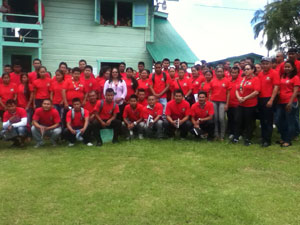 have risen to the call and are engaged in logging.
have risen to the call and are engaged in logging.
“They haven’t looked outside for resources,” she added, noting that the people, instead, chose to exploit their resources and generate a “brand for themselves.
“This can happen anywhere…success will not come overnight, it might even outlive some leaders, but one day each village will be able to brand their own product which will in turn become a branding for your village,” Minister Sukhai pointed out.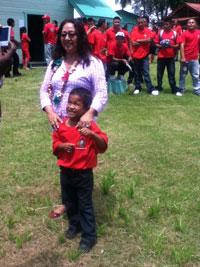
Observing that Amerindians often look outside of their communities for employment, she acknowledged the crucial need for job creation in these villages. Sukhai therefore encouraged the people to remain and “change their mindset about their environment,” while seeking to preserve their heritage and their languages.
The Amerindian Affairs Minister further stated that she has called on other ministries to assimilate youth development into their agendas, because the future is dependent on them and she also challenged the toshaos and the village councils to look internally at their human resources and implement ways to sustain it and enhance it. “Use up the resources that you have,” she said, adding that nothing but success is expected from this project.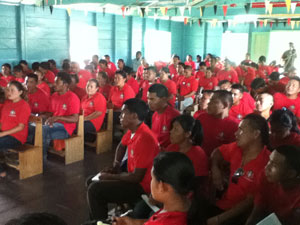 “We have been moving across the hinterland regions to launch the Youth Entrepreneurship and Apprenticeship Project and you have found the time and shown the interest by traversing many rivers…and we are grateful…today is your day….and it’s not what your community can do for you but what you can do for your community. So don’t see yourselves as the pilot project, but see yourselves as the pilot who has [to] ensure that his project lands successfully,” she urged them. She called on them that they should not allow their languages to decay, but to create and preserve an identity for themselves and their villages.
“We have been moving across the hinterland regions to launch the Youth Entrepreneurship and Apprenticeship Project and you have found the time and shown the interest by traversing many rivers…and we are grateful…today is your day….and it’s not what your community can do for you but what you can do for your community. So don’t see yourselves as the pilot project, but see yourselves as the pilot who has [to] ensure that his project lands successfully,” she urged them. She called on them that they should not allow their languages to decay, but to create and preserve an identity for themselves and their villages.
EVERYTHING HAPPENS NOW
Meanwhile, Nigel Dharamlall, Permanent Secretary of the Ministry of Amerindian Affairs, encouraged the youths to look ahead at the path before them in order to achieve their goals. “Nothing happens in the future, everything happens now. Therefore our intervention into your lives is now. So don’t think about what will happen in the future, think about now… don’t focus on the stipend because we are worth more than we are paid,” he said, pressing them to focus on their individual contribution towards the expansion of their communities.
“Our intention is to bring life lessons to you so that you can move forward…so that your villages can move forward. That’s why this project is important to us. It makes no sense that we build roads, schools and multi-purpose centres…but our people are left behind,” he said in an impassioned speech to the people gathered. “The important investment for our government and our ministry is the investment in the lives of our people.”
Dharamlall reminded that this is an initiative of the President of Guyana, Donald Ramotar. He added that it is a novel idea in the government because it is different from other projects. The government is not only investing in individual villages but most prominently in the lives of people.
The YEAP, he said, would deposit life lessons into the daily lives of the hinterland people. “You have to take action now! If we don’t put the effort in, then you wouldn’t go forward,” he challenged, urging them to love themselves. “Because one day you could be the next minister, one day you could rise to the rank of being the next President of Guyana.”
Toshao of Kamarang, Rio Melville said that he was proud to have the project implemented in his community and the region. He added that his people will be the beneficiaries of the programme because there would be shared experience and knowledge being passed on to the younger ones in the villages.
Over 200 young people have registered for the Youth Entrepreneurship and Apprenticeship Project in Region 7. The programme aims to support hinterland young people within the ages of 18-40 through apprenticeship attachments that would build their capacity to better manage, lead and govern their communities while fostering individual development. The project was also launched in Region 1 and Region 9. It is part of the government’s commitment to develop and invest in the country’s human resources.



.jpg)



